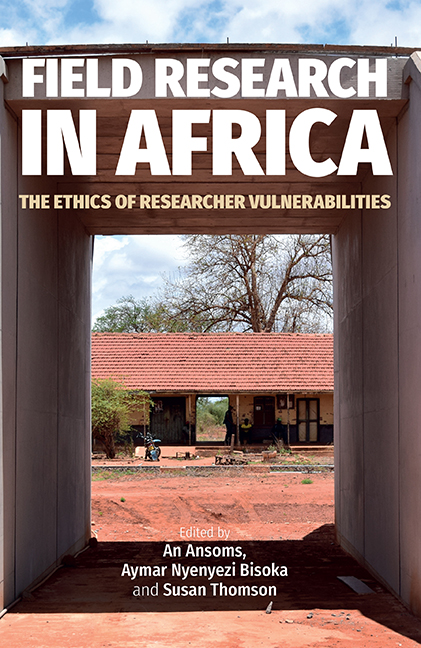Book contents
- Frontmatter
- Contents
- List of Contributors
- Foreword: It is about Us
- Map of Africa showing Fields of Research
- Introduction: Fields of Vision, Emotion as Reflexivity
- 1 Skin Connections: Negotiating Institutional Ethics alongside Insider Identities
- 2 Conducting Sensitive Research ‘At Home’: A Matter of Responsibility
- 3 A Gendered Research Journey: Ethical Dilemmas of an Algerian Immigrant Recovering the Memory of ‘Home'
- 4 Establishing Kinship in the Diaspora: Conducting Research among Fellow Congolese Immigrants of Cape Town
- 5 ‘If they find out, we're dead': Intermediaries, Self-censorship, and Anxiety in Research as an Outsider-Insider
- 6 Looking Behind the Screen: Ethical Quagmires when Accessing Hidden Discourses
- 7 Scholar-Activist? On Relational Accountability and an Ethic of Dissemination
- Conclusion: Theorising Self as Ethical Research Practice
- Bibliography
- Index
7 - Scholar-Activist? On Relational Accountability and an Ethic of Dissemination
Published online by Cambridge University Press: 10 June 2021
- Frontmatter
- Contents
- List of Contributors
- Foreword: It is about Us
- Map of Africa showing Fields of Research
- Introduction: Fields of Vision, Emotion as Reflexivity
- 1 Skin Connections: Negotiating Institutional Ethics alongside Insider Identities
- 2 Conducting Sensitive Research ‘At Home’: A Matter of Responsibility
- 3 A Gendered Research Journey: Ethical Dilemmas of an Algerian Immigrant Recovering the Memory of ‘Home'
- 4 Establishing Kinship in the Diaspora: Conducting Research among Fellow Congolese Immigrants of Cape Town
- 5 ‘If they find out, we're dead': Intermediaries, Self-censorship, and Anxiety in Research as an Outsider-Insider
- 6 Looking Behind the Screen: Ethical Quagmires when Accessing Hidden Discourses
- 7 Scholar-Activist? On Relational Accountability and an Ethic of Dissemination
- Conclusion: Theorising Self as Ethical Research Practice
- Bibliography
- Index
Summary
Your writing is so important to us. It gives us hope. To know that someone who is not a Rwandan understands the country like we do is a gift. You are a true activist because you are not afraid to say what so many Rwandans cannot say – that the RPF has politicized the genocide and our history. Thank you for your work. Please keep writing. We need more foreigners to be a ‘voice of the voiceless’.
– Rwandan human rights activist, introducing me at an event in Canada, April 2011BEFORE I PUBLISHED my first book in 2013, dissident Rwandans living in parts of Europe, Canada, and the United States saw me as a scholar-activist. I was ‘true’ because they thought that my research findings – which critiqued the post-genocide policy of national unity from the perspective of thirty-seven rural poor – overlapped with their political aspirations to unseat the current government. They saw me as an activist because I used my academic platforms to share my findings with non-academic audiences through media interviews, opinion editorials, and from 2010, via social media platforms such as Twitter. While the mantle did not sit well with me, I did not challenge their framing of my scholarship as ‘activist’. Indeed, as a white academic raised and educated in Canada, I did not give my activist standing a second thought, even as I spent time working with Rwandans in the diaspora, helping them write press releases and policy briefs on political issues of importance to them, and later, writing affidavits to support the asylum applications of Rwandans seeking to leave the country. Others considered me an ally because the government had shuttered my research in August 2006, claiming it was against ethnic unity. The Ministry of Local Government officials soon ordered me to participate in a citizenship re-education camp, something I did to protect the identities of the rural people I consulted as part of my project (Thomson 2009a; Thomson 2011).
When Rwandans in the diaspora learned about my forced re-education, many expressed dismay upon learning that I had been treated roughly ‘like us [dissenting] locals’, and that I now knew what ‘it felt like to be a target of the government’. I failed to fully appreciate what my experience of being forced to leave Rwanda meant to them, and how this shaped their expectations of me.
- Type
- Chapter
- Information
- Field Research in AfricaThe Ethics of Researcher Vulnerabilities, pp. 117 - 136Publisher: Boydell & BrewerPrint publication year: 2021



